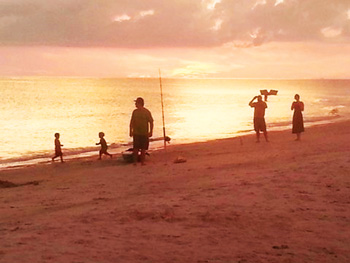
Vol. 16 No. 12 - January 20, 2016
FEATURE
Shark fishing rules differs from city to city

Courtesy Holmes Beach Police Department.
The photograph provided by Holmes Beach Police Chief
Bill Tokajer illustrates concerns raised in 2013 about shark
fishing taking place in the vicinity of resort guests.
HOLMES BEACH – By enforcing pre-existing city ordinances, the city of Holmes Beach has managed to address shark fishing concerns without specifically prohibiting the activity.
In 2013, representatives from three Gulf-front resorts raised concerns about chumming and sharks being brought ashore in a manner that presented risks for guests. Concerns were also raised about shark carcasses being discarded on the beach.
This prompted Police Chief Bill Tokajer to research city ordinances for potential solutions.
In Chapter 30-81, he found language that states: “Activity within the city which exists or occurs in such manner as to threaten or endanger the public health, safety or welfare, or adversely affect and impair economic welfare of adjacent property is hereby declared to be a nuisance.”
This chapter also prohibits the accumulation of dead animals and fish in a manner that threatens or endangers public health, safety or welfare, or adversely affects economic welfare.
Section 54-1 addresses unlawful deposits and states that it is unlawful to cast, place, throw, dump or otherwise dispose of any garbage, waste or debris in or on any canal, lake, inlet or other body of water.
Last week, Tokajer discussed the impact these ordinances have had on shark fishing.
“We do not have a specific ordinance that speaks to shark fishing. We do have an ordinance that says any activity within the city that threatens or endangers public health, safety, welfare, or adversely affects and impacts the economic welfare of adjacent property is declared a nuisance and not allowed. And we have the one that says you can’t throw dead animals or dead fish or anything into a canal, inlet or any other body of water within the city. You can’t chum the waters,” he explained.
“If you want to shark fish, you need to do it from a boat in the water, not from the land. Our entire waterway is considered a resort area. Bringing sharks to shore is unsafe and we’re going to rely on the code that’s been in effect since 1978,” he said.
“We began utilizing this ordinance to combat the problem we were having with the unsafe manner in which people were shark fishing from shore around children and other people who were swimming. My guys go out in the evening on our beach vehicles and patrol the waterways for shark fishing. If they see anybody, they tell them they have to move on, and they do so. We have not had any problems and the resorts are very thankful.”
When asked how his officers determine whether someone is fishing for sharks or something else, Tokajer said those determinations are made based on the type of fishing gear, equipment and tackle being used.
Farther south
Bradenton Beach Police Chief Sam Speciale and Lt. John Cosby said they were not aware of any recent conflicts or concerns regarding shark fishing in their city.
A search of the Bradenton Beach ordinances revealed section 46-46, which states no person in a park shall fish offshore from any type of boat within 300 feet of a public beach, pier or authorized fishing groin or pier; nor shall any person at any time fish in any area where bathing is permitted.
Sec. 66-60 says no person shall fish from any area of the beach that is designated solely for swimming.
For general safety purposes, Manatee County designates the southwestern tip of Coquina Beach as a no entry zone for swimmers, waders, fishermen, kayakers and others; and the county recently enlarged the no entry zone to include the southeastern tip of the Island.
